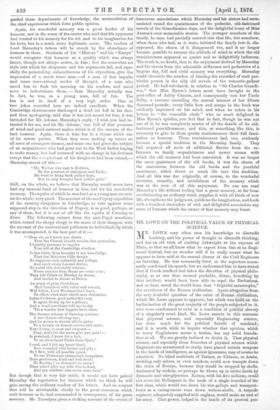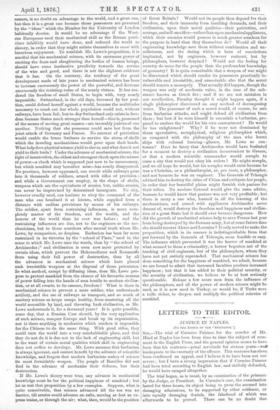MR. LOWE ON THE POLITICAL VALUE OF PHYSICAL SCIENCE.
MR. LOWE very often uses his knowledge to discredit learning, and his power of thought to discredit thinking, and has an old trick of exalting Arkwright at the expense of Plato, so that we all know what to expect from him at an Engi- neers' festival, but we wonder still if be really meant what he appears to have said at the annual dinner of the Civil Engineers on Saturday. He was necessarily brief, or the reporters neces- sarily condensed his speech, but we understand him to have stated that if Greek intellect had taken the direction of physical philo- sophy, as at one time seemed probable, Rome, benefiting by that intellect, would have been able to repel the Barbarians, and so have saved the world from that "frightful catastrophe," the overthrow of the Roman civilisation. Apart altogether from the very doubtful question of the value of Roman civilisation, which Mr. Lowe appears to approve, but which was built on the barbarization of the great majority of the people subjected to it, who were condemned to exist in a condition of praadial slavery of a singularly cruel kind, Mr. Lowe asserts in this sentence that physical science, and especially Engineering science, bas done much for the political benefit of mankind; and it is worth while to inquire whether that opinion, which to many Englishmen seems a truism, has any solid founds- tion at all. We are greatly inclined to doubt it. That physical science, and especially those branches of physical science which Engineers are accustomed to study, have placed certain weapons in the hands of intelligence, as against ignorance, may of course be admitted. No blind multitude of Tartars, or Chinese, or Arabs, wielding only sabres, or even muskets, could now trample down the cities of Europe, because they would be stopped by shells, decimated by rockets, or perhaps be blown up in entire herds by dynamite and nitroglycerine. Xerxes, with his five millions, could not cross the Hellespont in the teeth of a single ironclad of the first class, which would run down his war-galleys and transport- boats as a racing-canoe runs down walnut-shells. A torpedo engineer, adequately supplied with engines, would make an end of his army. That power, lodged in the hands of its present pos. sewers, is no doubt an advantage to the world, and a great one, but then it is a great one because those possessors are governed by the " ideas " which the Member for the University of London habitually decries. It would be no advantage if the West- ern Europeans used their mechanical skill as the Roman patri- cians infallibly would have done, and reduced the world to slavery, in order that they might satiate themselves to ennui with luxurious enjoyment. To establish Mr. Lowe's proposition, it is needful that his mechanical science, with its enormous power of exciting the fears and slaughtering the bodies of human beings, should have some instinctive proclivity towards the service of the wise and good, and there is not the slightest evidence that it has. On the contrary, the tendency of the great development made of late years in mechanical science has been- to increase enormously the power of the powerful, and decrease enormously the resisting-value of the manly virtues. It has ren- dered the freedom of small States, to begin with, very nearly impossible. Switzerland, in the old days, favoured by her posi- tion, could defend herself against a world, because the multitudes necessary to crush out her whole population could not, without railways, have been fed; but to-day Switzerland only exists in free- dom because States much stronger than herself—that is, possessed of the means of moving great masses—are incurably jealous of one another. Nothing that she possesses could save her from the joint attack of Germany and France. No amount of patriotism would enable the brave Switzers to survive the storm of shells which the invading mechanicians would pour upon their heads. What help does physical science yield to slaves, and what does it not yield to their lords ? Under the advance of mechanical science, the right of insurrection, the oldest and strongest check upon the misuse of power—a check which is supposed just now to be unnecessary, but which mankind may hereafter miss—has nearly disappeared. No province, however oppressed, can revolt while railways pour into it thousands of soldiers, armed with rifles of precision ; and while a Government can employ, in the shape of shells, weapons which are the equivalents of armies, but, unlike armies, can never be improvised by determined insurgents. No city, however cruelly used, can hesitate to obey the command of the man who can bombard it at leisure, while supplied from a distance with endless provisions by means of his railways. The soldier, apart from restraining influences, is more com- pletely master of the freedom, and the wealth, and the honour of the world than he ever was before ; and the restraining influences are due, not to the engineers or the me- chanicians, but to those searchers after mental truth whom Mr. Lowe, by comparison, so despises. Barbarism has been far more restrained in its victories by the "school of Plato," used in the sense in which Mr. Lowe uses the words, than by "the school of Archimedes ;" and civilisation is even now more protected by certain ideas, which prevent the Ilohenzollerns and Romanoffs from using their full power of destruction, than by all the advances in mechanical science which have placed such irresistible weapons at the disposal of those potentates. In what method, except by diffusing ideas, does Mr. Lowe pro- pose to protect mankind from the chance of his favourite sources of power falling into the hands of men hostile to modern civilisa- tion, or at all events, to its essence, freedom? What is there in mechanical science to prevent a mere soldier, who understands artillery, and the use of railways is transport, and so much of sanitary science as keeps camps healthy, from mastering all the world accessible by land, and throwing back civilisation, as Mr. Lowe understands it, for a thousand years? It is quite possible, some day, that a Russian Czar should, by the very application of such science, conquer Europe and break up its organisation, nor is there anything in mechanics which renders it impossible for the Chinese to do the same thing. With good rifles, they could turn the world into a very uninhabitable place, and that they do not do it is due not to the lack of engineering skill, but to the want of certain moral qualities which skill in engineering does not suffice to develope. Mr. Lowe assumes that barbarism is always ignorant, and cannot benefit by the advance of scientific knowledge, and forgets that modern barbarism makes of science its most formidable weapon. The people of Bazeilles did not find in the advance of mechanics their defence, but their destruction.
If Mr. Lowe's theory were true, any advance in mechanical knowledge must be for the political happiness of mankind ; but let us teat that proposition by a few examples. Suppose, what is quite conceivable, that science advanced till the sea was no barrier, till armies could advance on rafts, moving as fast as ex- press trains, or through the air; what, then, would be the position
of Great Britain? Would not its people then depend for their freedom, and their immunity from insulting demands, and their civilisation, upon their moral qualities—their patriotism, and courage, and self-sacrifice —rather than upon mechanical appliances, which their enemies would possess in much greater numbers for the purpose in hand than they themselves do ? Would all their engineering knowledge save them without combination and un- selfishness, and the daring which is born of convictions implanted, not by engineers, however eminent, but by philosophers, however despised ? Would not the feeling for country do more for the people than the profoundest knowledge of geometry? It is quite conceivable that a weapon of war might be discovered which should render its possessors practically in- vulnerable and irresistible, and conceivable also that the secret should remain a monopoly. That actually did happen, though the weapon was only of moderate value, in the case of the sub- stance known as Greek fire ; and if we are not mistaken in our recollection, Faraday thought it might happen again, if a single philosopher discovered an easy method of decomposing water. The possessor of such a secret would, of course, be safe from barbarian attacks, and might defend all civilisation from them ; but how if he were himself in essentials a barbarian, pre- pared to enslave the world for his own contentment? He would be too enlightened? Why ? if he were not dominated by those speculative, metaphysical, religious philosophies which, as compared with the philosophy of the man who blunt ships with colossal burning - glasses, Mr. Lowe so con- temns? Does he fancy that Archimedes would have hesitated for a moment to destroy a civilisation inconvenient to Greece, or that a modern scientific commander would scruple to erase a city that would not obey his orders ? He might scruple, and we all hope he would, but his scruples would exist because he was a Christian, or a philanthropist, or, pro tanto, a philosopher, and not because he was an engineer. The Generals of Tchengis advised him to destroy the cities of China and extirpate her people, in order that her beautiful plains might furnish rich pasture for their tribes. No modern General would give the same advice, because he would know that pasture was not very profitable; but there is many a one who, learned in all the learning of the mechanicians, and armed with appliances Archimedes never dreamt of, would destroy the freedom and happiness and civilisa- tion of a great State lest it should ever become dangerous. How did the growth of mechanical science help to save France last year from being destroyed by the German army, lest at some future time she should recover Alsace and Lorraine ? It only served to make the proposition, which in its essence is indistinguishable from that put forward by the Generals of Tchengis, seem feasible or easy. The influence which prevented it was the horror of mankind at what seemed to them a criminality, a horror begotten not of the teaching of civil engineers, but of the philosophers, whom they have not yet entirely superseded. That mechanical science has done something for the happiness of mankind, we admit, because we are bound to admit that increased faculties produce increased happiness ; but that it has added to their political security, or the security of civilisation, we believe to be at best seriously questionable. Release a few score men from the influence of the philosophers, and all the power of modern science might be used, as it is now used in Turkey, or would be, if Turks were a trifle richer, to deepen and multiply the political miseries of mankind.



































 Previous page
Previous page